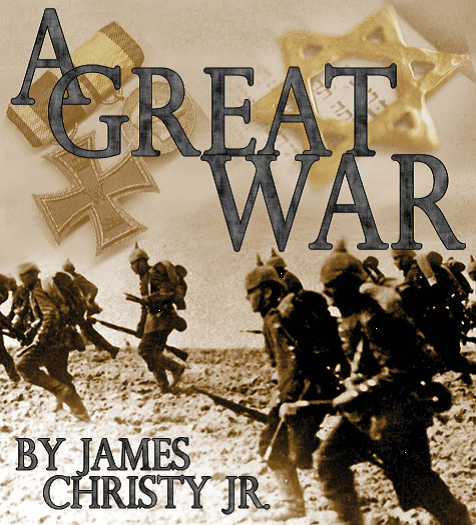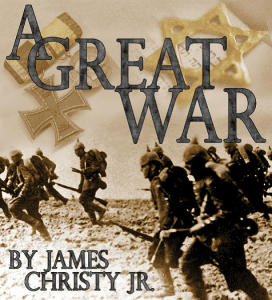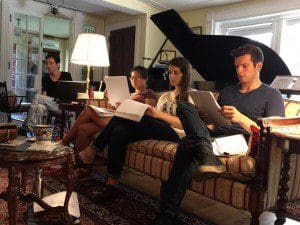Kensington Fringe: War Becomes a Family Affair
“In my view, wars can only happen with a certain level of deceit. Those who make a case for war will line up the facts to show it to be a necessity; those sent into combat are told that their personal honor is at stake. They must be willing to die for a cause without questioning it.”
For this 2015 Fringe Festival production, Iron Age Theatre out of Norristown bring together a local father-son team to take on the subjects of war, honor, and suffering in A Great War. With A Great War, playwright James Christy Jr. takes the intrigue of World War I history and spins it into a drama of violence and politics that resonates with the international turmoil of today. Christy has participated in workshops with PlayPenn and InterAct Theatre’s 20/20 Commissions program. He has also had plays produced from Phoenix to Princeton. Christy’s father and longtime professor of theater at Villanova University, James Christy Sr. directs the production to be set in the bare-brick MAAS Building in Kensington, September 10-27. We caught up with both the playwright (James Christy Jr.) and the director (James Christy Sr.)—if you can keep it straight!—to talk about war and what it’s like to work together.
FringeArts: What is A Great War about?
James Christy Sr.: The play is a penetrating and sensitive inquiry into causes and effects of World War I, as experienced by a young German Jewish soldier. During these century-anniversary years of the “war to end all wars,” it feels pertinent to examine how and why mankind launched such a massively self-destructive project, particularly in our era of elective wars.
FringeArts: How did this play start for you?
James Christy Jr.: I started thinking about it not long after the Iraq war in 2007. I became interested in why we fight wars, both from the perspective of the elites who set a war into motion and the soldiers who live through the reality. In my view, wars can only happen with a certain level of deceit. Those who make a case for war will line up the facts to show it to be a necessity; those sent into combat are told that their personal honor is at stake. They must be willing to die for a cause without questioning it.
And so initially it started with the concept of a soldier that couldn’t die. I wanted to portray a situation in which a soldier is so eager for combat, and believes so fiercely in the war and his honor, that he’s unable to be killed. But over time, as he kills so many and sees so much suffering, he comes to wonder if his survival is a gift or a curse.
Senior: I usually know of Jim’s writing projects. I remember attending a very intriguing reading of it at a New Jersey theater about two years ago and was very impressed with its vision and dramatic writing.
FringeArts: How have you developed this show over the years?
Junior: I’ve had three readings of the play, including a development workshop in Phoenix, Arizona. It’s gone through substantial revisions over the years. Mostly focused developing the characters and on the path of the young Jewish soldier and how he comes to grips with his actions in the war.
FringeArts: What about World War I attracted you or inspired you to produce this play?
Junior: I’ve always been fascinated with World War I, as I feel so many of today’s conflicts still have its roots in that war and its aftermath. And mainly because by almost all accounts, it was an avoidable war. It was one in which the conflicting ambitions of nation states lead to war because of ignorance, fear, and pride. It was a war that could have been avoided with diplomacy—and almost was—but for the ambition and hubris of the military elites, particularly in German, France, and Russia.

“A Great War” plays in the bare-brick space of the MAAS Building in Kensington.
FringeArts: Does this play respond to the politics of today?
Senior: One of the play’s concerns is the famous Schlieffen plan which was intended to conquer Germany’s enemies in six weeks. The plan and its infatuation with military superiority, and its unrealistic delusions about strategic success are strikingly similar to the narcissistic shock-and-awe consciousness of our present day warmongers.
FringeArts: Can you speak about the interaction between history and fiction in the play?
Junior: In 1905, the head of the German high command General Von Schleiffen, developed a secret war plan for a surprise attack to defeat the French army in six weeks. While the strategy was deeply flawed, it was regarded with near religious fervor in the military and would become the basis for the start of World War I.
A Great War shows Von Schlieffen and his plan as a backdrop for historical fiction. The other characters are invented. But the character of Michael Weis, a patriotic German Jewish soldier, is a reflection of a reality at the start of World War I. While there was rampant anti-semitism in Germany at the time, the Jewish community broadly supported the war, feeling that if Jewish men enlisted and showed their patriotism, they would be recognized as true Germans and the divisions would fade.
FringeArts: What is it like to work as a father-son tandem? How do you collaborate and divide the work of creating this play?
Senior: Making theater events has been my life and Jim grew up in that world. As a director, I have never written a play and have always been a bit awed by those who can. That my son can write so beautifully and feelingly is something I am immensely proud of and to help his work be realized is an honor and a joy. The play’s story, ideas, characters, and writing all originate with Jim’s research and imagination. I respond by reading the play, by attending readings, and by sharing my thoughts with him as I do with any playwright I am collaborating with. In production we work very closely with each other on any revisions and refinements.
Junior: Everyone wants to think their parents are the best at what they do. “My dad is the best—doctor/pizza maker/carpenter—in town!” So my opinion of my dad’s work might sound predictable. But it just so happens that my father is an extraordinary theater director. As a result, every part of this experience has been amazing. He knows the historical context, thinks deeply about the characters and situations, and he is an incredible communicator. The play has already gotten much better through his input and smart, probing questions. And more important I can trust his vision implicitly as we move towards production. The fact that he is my father, and that by directing the show he is indicating that he thinks my play is worthy of his time and artistic energy, makes this process that much more gratifying.
2015 Fringe Festival
A Great War
Written by James Christy Jr.
Directed by James Christy Sr.
Iron Age Theatre
MAAS Building
1325 North Randolph Street
Philadelphia, PA
September 10, 11, 13, 17, 18, 20
Click for tickets and info
—Brendan Farrell



